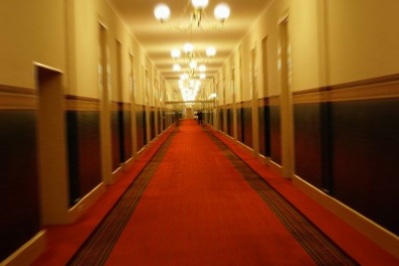Hilbert’s Paradox of the Grand Hotel

Hilbert’s paradox is one of the most mathematically wrong paradoxes.
A paradox is a logical deadlock, which comes as a consequence of the incorrect use or neglect of the properties and qualities of the objects with which we work in a problem or mental construction. That is most easily seen in the paradox called „Hilbert’s Hotel“.
The Hilbert’s paradox is as follow:
A hotel with an infinite number of rooms is fully occupied, with only one guest in each room. Let me put the condition another way: a hotel has infinitely many occupied rooms with one guest per room. Hilbert claims that the hotel can accept more guests, and not just one, but infinitely many, and this can be done infinitely many times.
How?
According to Hilbert, accommodating one more (and not just one) guest in a hotel with infinitely many occupied rooms is possible, and he „scientifically“ explained the solution as follows:
A new guest arrives at the hotel. To accommodate him, we have to simultaneously move all guests to a room with a higher number. Guest from #1 moves to #2, guest from #2 to #3, etc. to infinity. And here is that room #1 is free for the newly arrived guest.
Sly, eh?
On the contrary!
This is the greatest nonsense invented by a scientist.
Why?
Because in this case we have an incorrect use of the qualities and properties of the objects we work with.
In the problem we have to solve, Hilbert sets the condition that there are infinitely many occupied rooms in the hotel. This means that every room has a guest. And it follows that we have infinitely many „room/guest“ pairs.
And here comes the neglect of the qualities of the object we are working with, resulting in a paradox.
The object we are working with is an „infinite row of pairs“.
In all the infinity of pairs there is no empty room, because an empty room is not a pair, but an odd.
If we start working with odds in the given condition, we already ignore one of the qualities of the row, which is „row created only by pairs“.
To understand better the quality of the pair, and why in a row of pairs you cannot work with anything but pairs, I will explain it to you like this: concrete is a pair of water and cement. Once mixed, they cannot be separated.
In the row of pairs, the ratio between the members of the pairs is 50/50 percent.
We have 50% rooms and 50% guests.
Whether it is a finite or an infinite number of pairs, this percentage is always 50/50 because this is the quality of a pair.
The easy solution
Now forget the word „hotel“. Imagine an infinite row of boxes with one orange in each box. Empty one box by moving the oranges to the upper box in the row. Now we have an empty box. Is this empty box a member of the row „box/orange pairs”? If you persist in claiming that it is a member of the pair row, then the row is not infinite, because the boxes are with one more than the number of oranges.
It could not be explained easier than that. What bothers me is that a mathematician and philosopher of mathematics like David Hilbert lacked а common logic in solving such a childish problem.
See, I could only write: „When we empty one room, the rooms immediately become with one more than the occupants, which breaks the infinity. Because in infinity there is no “more”.“ But then I could not make you dive into the problem and make your brain hurt.
Every paradox has such a simple and short solution.



The paradox breaks in its initial definition. It says that Infinite amount of rooms are totally Full. Infinite suggests a set of numbers without an end. Full suggests a set of numbers WITH an end. So those two words cannot actually exist together in one statement as they contradict each other and making a statement that includes both of them is like saying „The sky is on the ground in this sunlit night“. Either the number of rooms is not infinite and they do have an end, or they are not all full 🙂 I don’t understand how that „paradox“… Прочети нататък »
But then again looking at the definition of the word paradox i think that there is nothing wrong with this one as well 🙂
paradox
ˈparədɒks/
noun
1.
a seemingly absurd or contradictory statement or proposition which when investigated may prove to be well founded or true.
„the uncertainty principle leads to all sorts of paradoxes, like the particles being in two places at once“
Is it seemingly absurd and contradictory? Yes it is. Then it must be a paradox 🙂
Here is another way to solve the paradox which I posted in StackExchange Three points to solve the paradox 1. If we vacate a room, we cannot use it for new guest unless we brake the infinity. How so? Because ∞+1=∞ rooms, and we already have infinite number of guests on the other side of the set (50/50 ratio is still present). Hence the conclusion that although it seams that we have an empty room we don’t really have one, because the number on both sides is always equal – infinite. 2. Not taking in account the above, we actually… Прочети нататък »